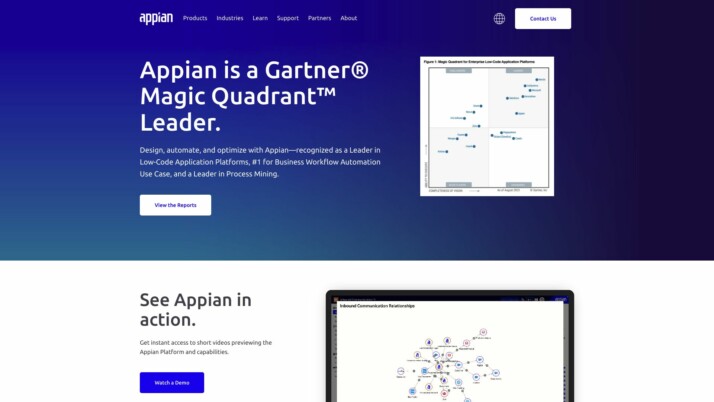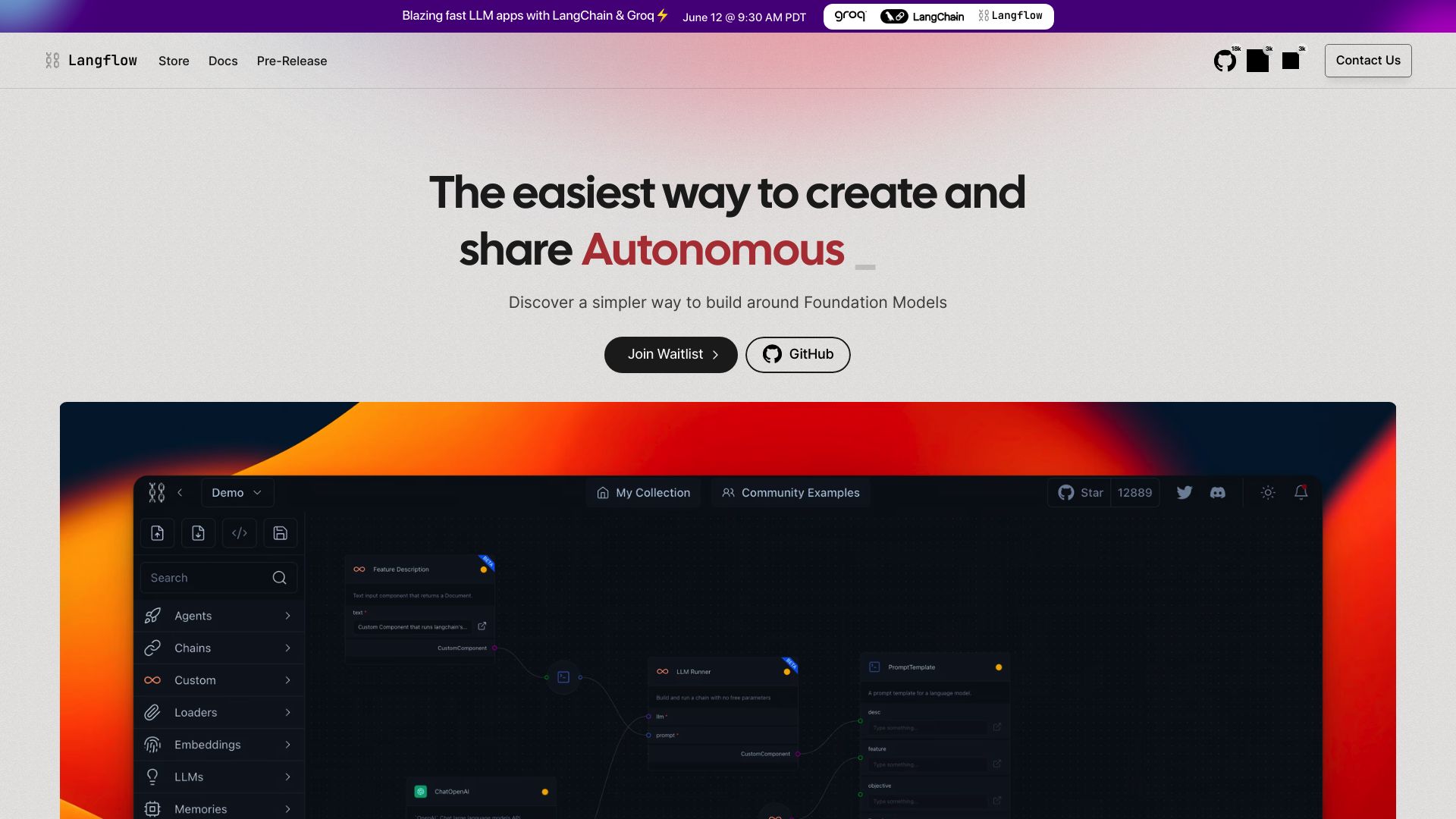Appian vs. Langflow: AI Platforms Compared for Business and Development
AI platforms revolutionize how businesses build intelligent applications, but choosing the right solution demands careful consideration. This comparison examines Appian vs. Langflow, and SmythOS, three powerful contenders in the AI development space. Appian streamlines AI integration for business processes, Langflow offers a flexible environment for custom AI agents, while SmythOS delivers a comprehensive platform combining ease of use with advanced capabilities.
We’ll explore each platform’s strengths, limitations, and ideal use cases, empowering you to select the AI solution that best fits your organization’s needs and technical expertise. Whether you’re a seasoned developer, a business leader, or an AI enthusiast, this analysis provides the insights to make an informed decision in your AI journey.
Appian Overview
Appian empowers businesses to harness artificial intelligence through its low-code platform. The software simplifies AI integration into existing workflows, making advanced technology accessible to users across technical skill levels.


Appian’s AI capabilities center on enhancing process automation. The platform offers pre-built AI skills for document classification, data extraction, and email routing. These features streamline operations in industries like finance, healthcare, and customer service. Appian also provides tools for building custom AI models without extensive data science expertise.
Appian empowers businesses to harness artificial intelligence through its low-code platform. The software simplifies AI integration into existing workflows…
The platform prioritizes data privacy and security. AI models created with Appian remain under the user’s control, addressing concerns about sensitive information. This approach makes Appian suitable for organizations with strict compliance requirements.
Integration with generative AI technologies like OpenAI expands Appian’s natural language processing abilities. This allows for advanced features such as automated email communication and intelligent document management. The Enterprise Copilot feature enables rapid information retrieval from curated knowledge sets, improving decision-making processes.
While Appian excels in process automation and low-code AI development, it lacks some advanced AI agent features. The platform does not offer explicit support for autonomous agents, multi-agent collaboration, or advanced debugging tools for AI models. Additionally, Appian’s focus on business process automation may limit its appeal for users seeking more flexible, general-purpose AI development environments.
Langflow Overview
Langflow empowers users to build AI applications through a user-friendly, low-code platform. The software simplifies complex AI workflows, allowing developers and non-technical users alike to create sophisticated AI agents and applications.
Langflow’s intuitive drag-and-drop interface stands out as a core feature. Users can visually construct AI workflows by connecting pre-built LangChain components, including large language models and specialized agents. This approach democratizes AI development, enabling rapid prototyping and experimentation without extensive coding knowledge.
Langflow’s intuitive drag-and-drop interface stands out as a core feature. Users can visually construct AI workflows… enabling rapid prototyping and experimentation without extensive coding knowledge.


The platform offers robust customization options. Advanced users can leverage Langflow’s powerful CLI for fine-grained control over project settings. The ability to create custom components using Python scripts further extends the platform’s capabilities, allowing users to tailor functionality to specific needs.
Langflow prioritizes security and ease of deployment. The software incorporates enhanced login mechanisms and supports environment variable configurations for secure authentication. API key functionality enables programmatic access to components and workflows, facilitating integration with existing systems.
While Langflow excels in accessibility and rapid development, it may present a learning curve for users entirely new to AI concepts. The platform’s low-code approach, while powerful, might not offer the same level of granular control as high-code solutions for highly specialized use cases. Scalability for large-scale deployments and extremely complex workflows remains an area for potential improvement.
Feature Comparison
Appian and Langflow offer distinct approaches to AI development and integration. Appian focuses on enhancing business process automation with AI capabilities, while Langflow provides a more flexible platform for building custom AI agents and workflows.
Appian excels in pre-built AI skills for document processing and email routing, ideal for enterprises seeking to augment existing workflows. Its low-code environment enables quick deployment of AI models without extensive data science expertise. However, Appian lacks explicit support for autonomous agents and multi-agent collaboration, limiting its appeal for more advanced AI applications.
Langflow’s drag-and-drop interface for constructing AI workflows using LangChain components offers greater flexibility for custom AI agent development. It supports rapid prototyping and experimentation, making it accessible to users with varying technical backgrounds. Langflow’s ability to create custom components using Python scripts provides more extensive customization options compared to Appian’s more structured approach.
In terms of security, Appian emphasizes data privacy and control, keeping AI models within the user’s domain. This approach makes it suitable for organizations with strict compliance requirements. Langflow also prioritizes security but offers a different balance, focusing on secure authentication mechanisms and customizable user management options.
While both platforms support API integrations, Langflow’s approach appears more open-ended, potentially offering greater versatility in connecting to external services and data sources. Appian’s integrations are robust but may be more tailored to specific business process automation scenarios.
Ultimately, the choice between Appian and Langflow depends on specific use cases and organizational needs. Appian suits enterprises looking to enhance existing processes with AI, while Langflow caters to those seeking a more flexible, experimental approach to AI agent development.
Feature Comparison Table
| Appian | Langflow | SmythOS | |
|---|---|---|---|
| CORE FEATURES | |||
| Hosted Agents (Dev, Production) | ❌ | ✅ | ✅ |
| Autonomous Agents | ❌ | ✅ | ✅ |
| Problem-Solving Capabilities | ✅ | ❌ | ✅ |
| Multi-Agent Collaboration | ❌ | ✅ | ✅ |
| Work as Team | ✅ | ❌ | ✅ |
| Bulk Work | ✅ | ❌ | ✅ |
| Agent Work Scheduler | ❌ | ❌ | ✅ |
| SECURITY | |||
| Data Encryption | ✅ | ❌ | ✅ |
| IP Control | ✅ | ❌ | ✅ |
| COMPONENTS | |||
| Foundation AIs | ❌ | ❌ | ✅ |
| Huggingface AIs | ❌ | ✅ | ✅ |
| Zapier APIs | ❌ | ✅ | ✅ |
| All other APIs, RPA | ✅ | ❌ | ✅ |
| DEPLOYMENT OPTIONS (EMBODIMENTS) | |||
| Deploy as API | ✅ | ❌ | ✅ |
| Production Domains | ✅ | ❌ | ✅ |
| API Authentication (OAuth + Key) | ✅ | ❌ | ✅ |
| Deploy as Site Chat | ❌ | ❌ | ✅ |
| Deploy as Scheduled Agent | ❌ | ✅ | ✅ |
| Deploy as GPT | ❌ | ❌ | ✅ |
| DATA LAKE SUPPORT | |||
| Hosted Vector Database | ❌ | ✅ | ✅ |
| Sitemap Crawler | ❌ | ❌ | ✅ |
| YouTube Transcript Crawler | ❌ | ❌ | ✅ |
| URL Crawler | ❌ | ❌ | ✅ |
| PDF Support | ✅ | ❌ | ✅ |
Best Alternative to Appian and Langflow
SmythOS emerges as the superior alternative to Appian and Langflow, offering a comprehensive AI automation platform that combines ease of use with unlimited potential. Our drag-and-drop interface simplifies the creation of complex AI workflows, making advanced AI development accessible to users of all skill levels.
We excel in areas where Appian and Langflow fall short. Unlike Appian’s limited AI integration focused on business process automation, SmythOS provides a versatile platform for building and deploying autonomous AI agents across various use cases. Our multi-agent collaboration feature enables sophisticated AI systems that Appian’s singular approach cannot match.
SmythOS provides a versatile platform for building and deploying autonomous AI agents across various use cases. Our multi-agent collaboration feature enables sophisticated AI systems
While Langflow offers flexibility in AI workflow construction, SmythOS takes it further with our extensive pre-built API integrations and support for a wide array of AI models. This allows for rapid development and deployment of AI solutions that seamlessly integrate with existing systems and data sources.
SmythOS stands out with its robust security features, including data encryption and IP control, addressing enterprise-level concerns that Langflow’s open-source nature may not fully satisfy. Our platform also offers unparalleled scalability, supporting everything from small-scale prototypes to large-scale production deployments.
With SmythOS, we provide a unique combination of powerful AI capabilities and user-friendly design. Our platform empowers users to create sophisticated AI agents that can be deployed as APIs, chatbots, or scheduled tasks, offering versatility that surpasses both Appian and Langflow. Choose SmythOS for a future-proof AI development solution that delivers on the promise of truly accessible and powerful AI automation.
Conclusion
Appian and Langflow offer unique approaches to AI integration, each with distinct strengths. Appian excels in enhancing business process automation with pre-built AI skills and robust security features. Langflow provides a flexible, low-code environment for custom AI agent development, appealing to those seeking rapid experimentation.
However, SmythOS emerges as the superior choice, combining the best of both worlds while addressing their limitations. Our platform offers unparalleled versatility with its “Create Once, Deploy Anywhere” philosophy, allowing seamless integration across multiple environments. SmythOS’s drag-and-drop interface rivals Langflow’s ease of use while providing the scalability and security that Appian prioritizes.
Unlike Appian’s limited support for advanced AI agents, SmythOS excels in multi-agent collaboration and autonomous agent deployment. We surpass Langflow’s capabilities by offering enterprise-grade features like data lake support, advanced debugging tools, and extensive API integrations.
For businesses and developers seeking a comprehensive AI solution, SmythOS stands out as the clear winner. Explore our diverse range of AI-powered agent templates to jumpstart your AI journey, or dive into our extensive documentation to unlock the full potential of our platform. Create a free SmythOS account today and experience the future of AI development – no commitment required, with unlimited agents and a 30-day money-back guarantee.
Last updated:
Disclaimer: The information presented in this article is for general informational purposes only and is provided as is. While we strive to keep the content up-to-date and accurate, we make no representations or warranties of any kind, express or implied, about the completeness, accuracy, reliability, suitability, or availability of the information contained in this article.
Any reliance you place on such information is strictly at your own risk. We reserve the right to make additions, deletions, or modifications to the contents of this article at any time without prior notice.
In no event will we be liable for any loss or damage including without limitation, indirect or consequential loss or damage, or any loss or damage whatsoever arising from loss of data, profits, or any other loss not specified herein arising out of, or in connection with, the use of this article.
Despite our best efforts, this article may contain oversights, errors, or omissions. If you notice any inaccuracies or have concerns about the content, please report them through our content feedback form. Your input helps us maintain the quality and reliability of our information.
